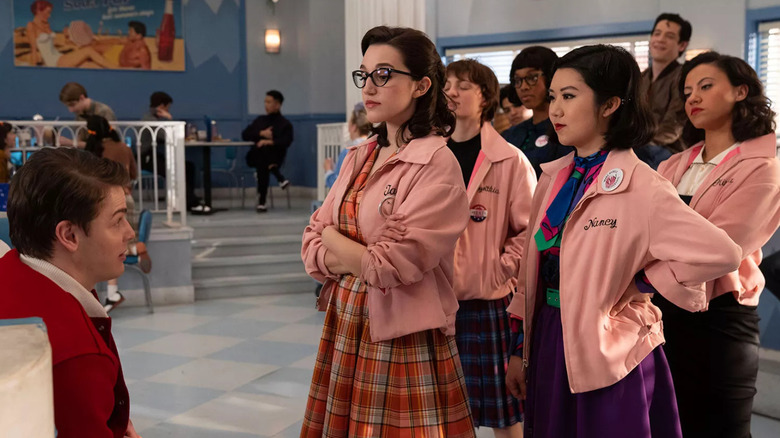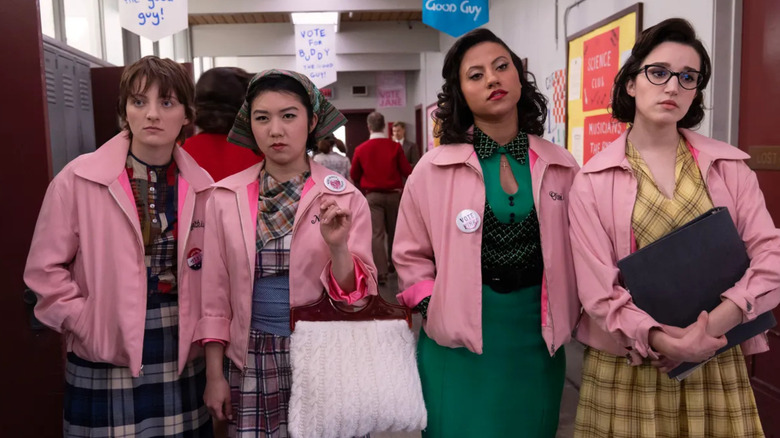Why Paramount+ Canceled Grease: Rise Of The Pink Ladies
Finding fun takes on classic stories can be difficult, but some clever creators have found ways to revisit recognizable properties while breathing a ton of life into a franchise that everyone loves. This little exercise of revisiting old faves has become almost essential for creatives looking to find a job in the current iteration of Hollywood, where everything has to have an instant hook or link to an existing intellectual property. Paramount stumbled into a delightful revision of "Grease" with "Grease: Rise of the Pink Ladies" over on Paramount+, but that win would be short-lived as the streamer decided to cancel the series after just one season. But the reason for ditching the charming little show is depressing, because the finances of the larger studio were the main driver behind the move to pull the plug on "Grease: Rise of the Pink Ladies."
The show begins four years before the events of "Grease," introducing Nancy Nakagawa, Jane Facciano, Olivia Valdovinos, and Cynthia Zdunowski before they were running things at the soon-to-be iconic Rydell High School. As former outcasts, the eponymous "Pink Ladies" take matters into their own hands and become undeniable in their own right, due to some really fun performances by Tricia Fukuhara as Nancy, Marisa Davila as Jane, Cheyenne Wells as Olivia, and Ari Notartomaso as Cynthia. It was a surprisingly good time and one that would be cut short as Paramount+ decided to not only cancel the show in 2023, but also pull it from the streaming service altogether just a few weeks later.
Series creator Annabel Oakes was shocked by the decision and let fans know how blindsided the team was by these decisions. "In a particularly brutal move, it is also being removed from Paramount+ next, and unless it finds a new home, you will no longer be able to watch it anywhere," she wrote on Instagram Stories. "The cast, my creative partners, and I are all devastated at the complete erasure of our show." Oakes added, "People are already sending messages and videos about how much the show meant to them, and I absolutely love hearing and seeing them. The #1 thing we would love is for you to watch the show before it comes down."
Paramount saw the opportunity for a tax benefit by canceling Grease: Rise of the Pink Ladies
A major story during 2023 was the adoption of canceling shows prematurely by many corners of the entertainment industry, spurred on by Warner Bros. Discovery CEO David Zaslav's cost-cutting efforts. There was a mass spreading-out of content at the tail end of the 2010s, and when there was no more land to absorb, the big players in the space began consolidating their holdings. Powers like Paramount and Warner Bros. Discovery followed suit by pulling back production across the board. (All of this coincides with the once-in-a-lifetime effect of 2020's health crisis and shareholders panicking that the money well in streaming had dried up!)
When you're cutting costs at this scale, executives begin by cancelling any project that isn't one of the 10 biggest things on the platform. And, despite being very fun, "Grease: Rise of the Pink Ladies" didn't quite meet that requirement and got the axe as a result. It's unfair because the show could have easily run for at least another two seasons at least, but the financial priorities ended up getting in the way, which stinks. Paramount would argue that they have numbers to back up their claims in Variety's reporting; however, anything that didn't appeal to the biggest audience possible quickly found itself on the outside looking in. That goes for more studios than Paramount, as Warner Bros. Discovery and others opted to shave that money at the expense of programming across the board.
"Grease: Rise of the Pink Ladies" honestly deserved better, and the same could be said of showrunner Annabel Oakes. She had a ton of positive feedback on the series as audiences found the show midway through that first season run, with some room for optimism about a second season. But, the volatile environment of TV cut the show short before the full audience that a show like this needs could find it. While the cancellation problem isn't as dire as it was back in 2023, we still see networks and studios pulling the plug on shows before they've had a chance to find their groove. All that does is ensure the audience becomes too invested in new programming, which begins the vicious cycle all over again.

